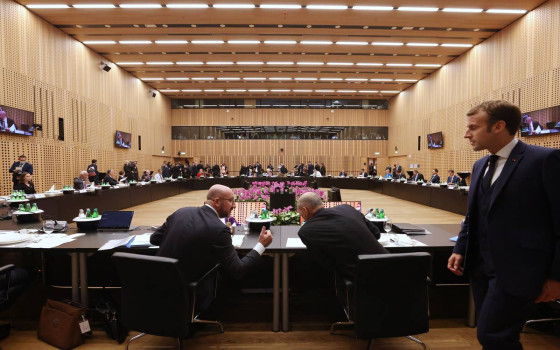
Results of the European tripartite consultations on Macron's plan to recognize the State of Palestine: Germany rejects recognition in the near term, and Britain stipulates a peace agreement.

- Europe and Arabs
- Saturday , 26 July 2025 12:49 PM GMT
Brussels - Paris: Europe and the Arabs
France's decision to recognize Palestine at the upcoming UN General Assembly represents an attempt to build momentum for change and break the stalemate among major Western powers in the face of Israel's mass killing of Palestinians in Gaza.
The Guardian newspaper considered Emmanuel Macron's announcement, announced with typical dramatic style on social media late Thursday night, to mark a watershed between the two paths pursued by the United States and France regarding the Gaza war and significantly increases pressure on the United Kingdom, Germany, and other G7 countries to choose a side.
Macron, Keir Starmer, and German Chancellor Friedrich Merz held what the British Prime Minister described as an "emergency call" on Friday to coordinate positions. This call resulted in a joint call for Israel to immediately lift its food blockade, implement an immediate ceasefire, and release hostages held by Hamas. However, there was no clear shift in the position of Merz or Starmer on recognition.
The German government stated that it "does not intend to recognize a Palestinian state in the near future." Starmer maintained his position that Palestinian statehood would only come as part of a series of coordinated steps toward peace.
He said: "Recognizing a Palestinian state must be one of those steps. I am committed to that. But it must be part of a broader plan that ultimately leads to a two-state solution and lasting security for Palestinians and Israelis."
The French argument is that, in the absence of any sign of movement toward a ceasefire, European governments must try to break the deadlock using the tools at their disposal.
"This clearly puts enormous pressure on the UK to do the same," said Victor Kattan, associate professor of public international law at the University of Nottingham. France and the UK are close allies and clearly spoke about this during Macron's visit to the UK a few weeks ago.
This continuing shift in Western European positions comes at a time when UN officials and a growing number of legal experts are accusing Israel of genocide in Gaza. The International Court of Justice in The Hague is currently considering charges of genocide against Israel, filed by South Africa in December 2023.
France's declared intention to recognize Palestine, joining approximately 147 other UN member states, is clearly a response to the catastrophic situation in Gaza, with the increasing number of deaths from starvation due to the Israeli blockade, in addition to the heavy losses among Palestinians killed by Israeli bombing and gunfire. According to what the Al-Youm Al-Sabea news website reported from news agencies,
British Prime Minister Keir Starmer said on Friday that the government would only recognize a Palestinian state within the framework of a negotiated peace agreement, disappointing many in the ruling Labour Party who wanted him to follow France's lead in accelerating this move.
French President Emmanuel Macron announced on Thursday that his country would recognize a Palestinian state, a plan that was met with strong condemnation from Israel and the United States, following similar steps by Spain, Norway, and Ireland last year. After holding talks with Macron and German Chancellor Friedrich Merz to discuss ways to pressure Israel to end its war in Gaza, Starmer said he was focusing on "practical solutions" that he believed would make a real difference in ending the war.
He added: "Recognizing a Palestinian state must be one of those steps. I am serious about that... but it must be part of a broader plan that ultimately leads to a two-state solution and ensures lasting security for Palestinians and Israelis."
More than 220 members of parliament, nearly a third of the House of Commons, most of them Labour members, sent a letter to Starmer on Friday urging him to recognize a Palestinian state.
Successive British governments have previously said they would formally recognize a Palestinian state in due course, without setting a timetable or specifying conditions.
Earlier on Friday, British Science and Technology Minister Peter Kyle said his country's top priority now was to alleviate the suffering in the Gaza Strip and bring Israel and Hamas together to reach a ceasefire. In statements to Sky News, Kyle said: "We want a Palestinian state, we desire it, and we want to ensure that the conditions are in place that can enable this kind of long-term political solution to be achieved."
He added: "Right now, today, we have to focus on what will alleviate the extreme and needless suffering in Gaza, and that must be our priority today."
This week, London Mayor Sadiq Khan and Labour MPs on the Parliamentary Foreign Affairs Committee argued that Britain should recognize a Palestinian state. British Minister Shabana Mahmood believed that such a step would have "many benefits" and send a message to Israel.
The Parliamentary Foreign Affairs Committee said on Friday: "The government cannot continue to wait for the right time. Experience shows that there will never be a perfect time."
One Labour MP said there was discontent within the party with Starmer's position because the government had not taken stronger diplomatic steps to condemn Israel.
He added: "Most of us are very angry about what is happening in Gaza, and we believe our position is very weak."












No Comments Found